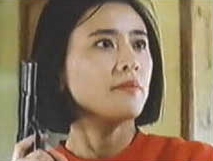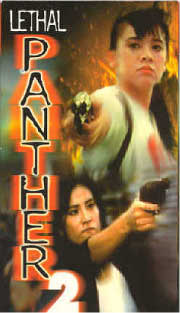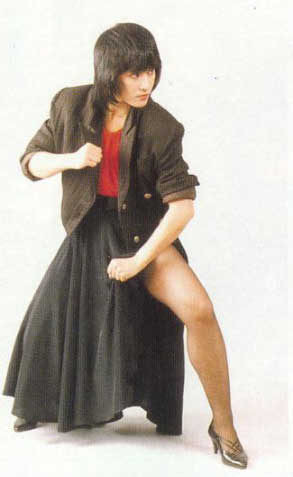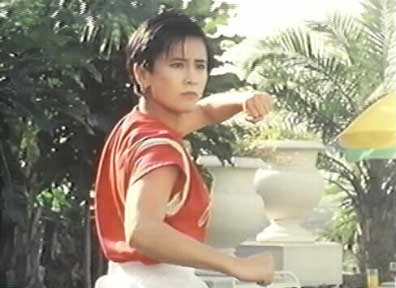




|
|
|
|
Despite having appeared in a number of the classics of the "girls-with-guns" (female-oriented action) genre in the late 1980's through the early 1990's, Yukari Oshima (sometimes credited as Cynthia Luster, Dai Do, or Tsumura Yukari) has never really risen above cult status to a select group of (mostly) Western fans. This is a shame, since Yukari was not only one of the best action performers of the time, she was also a capable actress who brought dimensionality to many stereotypical roles. In fact, her unwillingness to adopt to gender stereotypes helped to cement the "tough female" within the popular Western fan conciousness which has suddenly become so popular over the past few years.
Little is known about Yukari's beginnings, partly due to the fact that she has not given very many interviews except to talk about specific technical parts of her work, and also that the normally gossip-hungry Hong Kong press seemed to not be interested in her, since she generally did not flaunt sexuality in her roles. As a teenager, she trained in goju ryu karate, as well as with various weapons, most notably staves, swords, and sticks -- all of which would be displayed in her later film work. After graduating high school, Yukari attended Sonny Chiba's stunt school and then went on to work on several Japanese television shows, starting with Ghost Cop in 1982. After a few years, Yukari grew tired of the more "showy" Japanese style, and headed to Hong Kong to find more challenging work.
After a couple of small roles in Taiwanese movies, Yukari moved on to Hong Kong with a role in 1986's Millionaire's Express (aka Shanghai Express). Though her part as a female samurai was short on screen time, an outstanding fight with Richard Norton impressed producers enough so that she began to get steady roles. Yukari also established a persona which she would stick with more or less throughout her career -- an asexual, powerful fighter.
Her next film, Angel (1987), would cement this image as she played an "ice queen" played off against "cutie-pie" Moon Lee. This would be the first of many pairings of Yukari and Lee which resulted in solid movies such as Kickboxer's Tears (1992). Due to Lee's more conventional Chinese looks and style, she was oftentimes given much more screen time. However, Angel Terminators II (1993), a movie where Yukari and Lee switch places (with Lee being the "bad girl") and the duo sharing screen time equally, resulted in one of the best films of the girls-with-guns catalog.
Even though Angel was a hit and no one could deny Yukari's talent, she could never really seem to find her place in Hong Kong movies. Part of this might have been due to her Japanese heritage, but it probably boils down to the fact that Yukari, in many people's opinions, wasn't considered very good-looking. She perpetuated this by not "sexing it up" or getting involved in romantic angles like many of her compatriots did -- it is rumored that the shot of Yukari's breasts in Angel is actually a body double. In perhaps a bit of irony, Yukari had an active off-screen love life, engaging in a series of romances with fairly high-profile actors and directors, including Frankie Chan, Mark Cheng and Phillip Ko. These relationships would begin to influence her on-screen output.
Her roles in the Frankie Chan films Burning Ambition (1989) and Outlaw Brothers (1990) resulted in box office success, but stories of on-set bickering with other actors (most notably fellow Japanese actress Michiko Nishiwaki) seem to have given Yukari something of a bad reputation, and her days in big-budget productions were numbered. As for Mark Cheng (who she was briefly married to), he seems to be the only actor Yukari was comfortable doing romantic scenes with (1990's Lethal Panther), but in true Yukari fashion, she equally dispensed punishment to the actor, as seen in Kickboxer's Tears, where she rips out Cheng's spinal cord.
It would be her later marriage to Phillip Ko that would hold the most influence over Yukari's career. Ko was a former "old-school" kung fu star who had moved onto action co-ordination and directing. Most of Ko's productions were cheap affairs, many times shot in Thailand or the Phillipines, and this seems to have affected many people's opinions of Yukari's work. While there were a few gems like Lethal Panther put out during this period, low-budget B-movies like Fatal Chase (1992) have wrongly presented Yukari as a bit player in the world of martial arts films. She even went so far as to taking roles in Category III (Hong Kong's version of the NC-17 rating) softcore pornographic films, such as Devil Girl 18 (1992) -- though she always kept her clothes on.
To make matters worse, Yukari also appeared in several movies produced or directed by Godfrey Ho, a film-maker best known for actually not making many films, but rather cutting and pasting footage from various sources together. Fans have always been puzzled as to why Yukari would appear in such movies. At any rate, bottom of the barrel junk like 1992's Angel the Kickboxer (a "tweaked" version of the US Cynthia Rothrock movie Honor and Glory), where Yukari's scenes were obviously put in from other sources or she simply played more subordinate roles comapred to her male co-stars, seemed to haved closed the doors on a "serious" career for Yukari.
However, she was determined to stick things out, and went so far as to establish her own talent agency and began training other female actors in stuntwork and martial arts. After the mid-1990's, the popularity of the girls-with-guns genre was dying down due to oversaturation, and this seems to have resulted in better work for Yukari. Drug Fighters (1995) was some of her best action work to date, and she followed this up with several roles in smaller films like Super Cops (1997). During this time, Yukari also took several roles (like 1998's To Kiss is Fatal) where her acting, rather than fighting skills, were showcased, due to a lingering injury which limited her punching abilities.
Yukari's output recently has slowed down, but this has only seemed to strengthen her. It Takes a Thief (1999) was a return to "vintage" Yukari action, and one of her best films in years. She now spends most of her time training people at Sonny Chiba's stunt school, as well as appearing in Japanese television shows and the occasional Hong Kong movie (2001's Xtreme Warrior). Even though she never has really attained major "star" status, Yukari Oshima's body of work -- despite the occasional clunker -- is an impressive feat that will continue to entertain audiences for years to come.
(Thanks to Hong Kong Cinema: View from the Brooklyn Bridge for providing some of the pictures and information for this page. If you would like a more in-depth analysis of Yukari's career, I would highly suggest a visit to the site.)